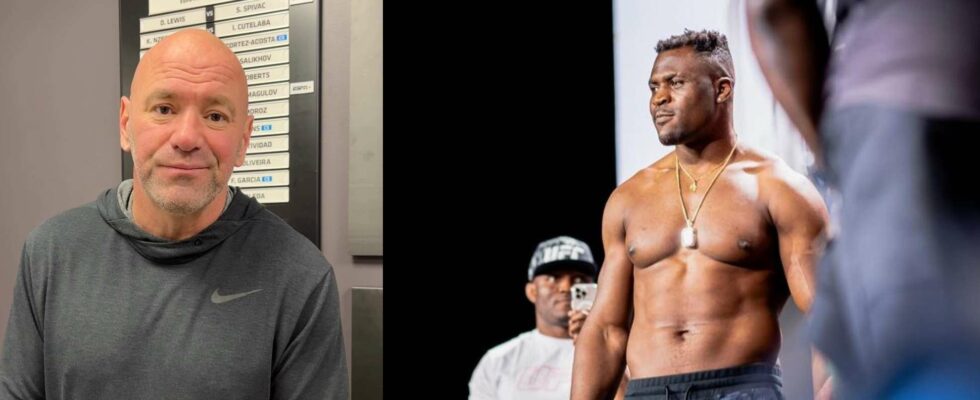Despite what Dana White would have you believe – he’s not actually all that enthused that two of his marketable stars have become free agents recently.
UFC went through a whole ordeal with Nate Diaz, culminating with him finally being able to leave on his terms.
Francis Ngannou had his own trials and tribulations with the company thanks to UFC’s unwillingness to let go off some of the worst contract provisions.
Still the negotiations softened considerably once Ngannou and his agent Marquel Martin left CAA (chief rival of UFC’s parent company Endeavor).
Martin reportedly founded his own shop, and Ngannou followed along.
Back in January, Ngannou elaborated on what he went through in preparation to defend his title against Cyril Gane. Not only was he injured, but his team also received some startling anonymous texts.
Now his knee is recovered, he’s started kicking again and he might already be a free agent. Unlike Diaz – Ngannou doesn’t have an exclusive negotiating period attached to his contract.
MMA writer John Nash evaluated the phrasing of UFC contracts in a social media discussion. He cited Ngannou’s public declaration that he signed his contract in December 2017 as evidence.
It was traditionally accepted that the start of the maximum five-year term specified in contracts is the first bout he had in UFC. That was January 20th, 2018 for Ngannou. According to that calculation, he would become available for signing on January 20, 2023, two days before the year mark since his triumph against Gane.
However, Nash cited a clause in a conventional contract that stated the effective date (the beginning of the five-year period) as the date on the signing page. All signs point to Ngannou signing the contract in the beginning of December 2017. Thus, it’s possible that Ngannou is already free to negotiate with other companies.
I think Ngannou might already be a free agent. A quick thread. (i'll be using excerpts from other UFC contracts, all of which have the same text)
1/ Ngannou has says he's a free agent in December, that would be based on the effective date of his contract… pic.twitter.com/OT5j4tO5NZ
— John S. Nash (@heynottheface) December 12, 2022
2/ The effective date is the date on the signature page. Based on all the interviews where Ngannou has mentioned being a free agent it sounds like the signed date was sometime in early December 2018. pic.twitter.com/NuRRKIPHbV
— John S. Nash (@heynottheface) December 12, 2022
2/ The effective date is the date on the signature page. Based on all the interviews where Ngannou has mentioned being a free agent it sounds like the signed date was sometime in early December 2018. pic.twitter.com/NuRRKIPHbV
— John S. Nash (@heynottheface) December 12, 2022
3/ the effective date (the date when it is signed) is the date the contract starts (commences) pic.twitter.com/RgtajqFdsf
— John S. Nash (@heynottheface) December 12, 2022
5/ 5 years after the date it was signed would be sometime in early December. I have said in the past that I thought the contract would end in January, but that's based on a faulty read of another contract, not the current standard. So Francis very well could be a free agent now.
— John S. Nash (@heynottheface) December 12, 2022
It’s also important to note that many have suggested that the champion’s clause may supersede the contract’s five-year maximum duration, effectively resetting the final 12 months. However, Nash drew attention to the clause in the contract that states that provisions like the champion’s clause do not preempt the five-year maximum outlined from the agreement’s effective date.
Will be talking about UFC contracts with @CrooklynMMA starting tomorrow, but wanted to answer people mentioning champions clauses or tolling from injury or turning down fights. In the same section is a clause that supersedes those other extensions (except for retirement) https://t.co/T4CAyX4hOO pic.twitter.com/zQJcpe6XVW
— John S. Nash (@heynottheface) December 13, 2022
